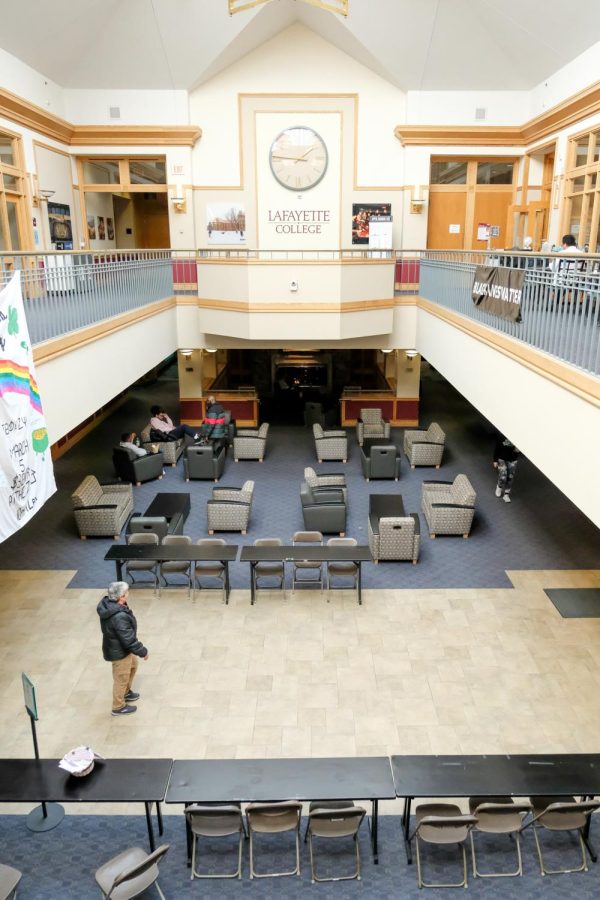Campus mask mandate loosened after updated CDC guidelines
Beginning March 1, students no longer have to wear masks in many indoor spaces. (Photo courtesy of Caroline Burns ’22 for The Lafayette)
March 4, 2022
After an update to CDC guidelines and Covid protocols on campus, Lafayette students will no longer be required to mask up in most indoor settings on campus.
As of Tuesday, masking is no longer required inside all campus buildings for all vaccinated members of the community. Exceptions include Bailey Health Center, Williams Center for the Performing Arts, Weiss Theater of Buck Hall, Studio Theater in 248 N. 3rd St and college transportation, such as the LCATS, according to the original announcement. Masks will remain mandatory in classrooms and laboratories too, but beginning March 7, individual faculty members may elect to make masking optional in classes and laboratories.
According to Vice President for Campus Life Annette Diorio, the decision to update the masking guidelines came after consultation with faculty, Student Government and the Administrative Council. It was based on the growing protection that the campus community has against the virus.
“The more widespread availability of KN95 (or better) masks have made it more realistic to relax universal masking requirements while remaining reasonably sure those who wished to protect themselves wearing a mask can do so,” Diorio wrote in an email. “We are aware that colleges and universities in the Lehigh Valley are among the last places to continue universal masking yet we have much higher vaccination and booster percentages for our community.”
Echoing Diorio’s comments, Director of Health Services Dr. Jeffrey Goldstein said that the change to the mask policy makes sense considering the changing Covid situation on a national level.
“Our change in policy kind of mirrors what the rest of the country is doing. Certainly, you know, our local cases and the cases within our internal community reflect that we’re on the downside of this, hopefully,” Goldstein said. “And then barring another serious variant coming our way, I think we can begin to approach a more normal college life. And as part of that, the masking protocol reflects our changing approach to Covid.”
The college’s decision to update the masking guidelines follows updates from the CDC. The new guidelines classify counties according to three levels of Covid transmission; Northampton County currently falls in the middle category, which means that with the exception of those at “potential increased risk,” masking is no longer explicitly recommended.
“What I would advise people to do is evaluate their own individual risk based on their medical history and also, you know, their own individual comfort level,” Goldstein said.
Goldstein emphasized that as a result of the high vaccination rate on campus and the increased ability to combat the worst symptoms of Covid with new therapeutics and antiviral drugs, the situation on campus remains safe, even more so than in most other communities.
“We’ve definitely achieved internal herd immunity. Way more than ninety percent of the students and staff are immune to Covid. So that changes the dynamics and certainly changes the metrics for health outcomes. And so, you know, my focus has always been health outcomes, not necessarily case counts,” Goldstein said.
While acknowledging concerns that some may have about a possible spike in cases as a result of travel during spring break, both Goldstein and Diorio believe that the chances of such an event are incredibly slim.
“I would say that students are already doing a fair amount of travel, and I am sure this is not going to surprise anyone, spend a fair amount of time socializing unmasked already,” Diorio wrote.
“I think the risk of acquiring a Covid infection during spring break is dramatically different than it would be in our own internal community in that, you know, students are socializing at college as much or more than they might be during spring break,” Goldstein said. “[A bump in Covid cases after break] could happen, but I think it’s very manageable,” Goldstein said.
According to the announcement, students can pick up Covid test kits at the Feather House for testing related to spring break, but this is not required.
Like the reduction of mask mandates, other Covid-related fixtures on campus are expected to phase out this semester. Diorio wrote that the college plans to gradually eliminate isolation housing and to allow more students to isolate in place shortly after returning from spring break.
Nevertheless, the college will remain flexible in light of changing circumstances.
“Covid is not over, that is for sure. While we know more about it and have better treatment options the possibility always exists that a particular variant would create more concern for college-age students,” Diorio wrote. “Individuals will still have the option to mask and I suspect a good number of folks will still mask in certain settings. We will always need to monitor our campus experience and make changes based on what we see on the ground.”






















































































































